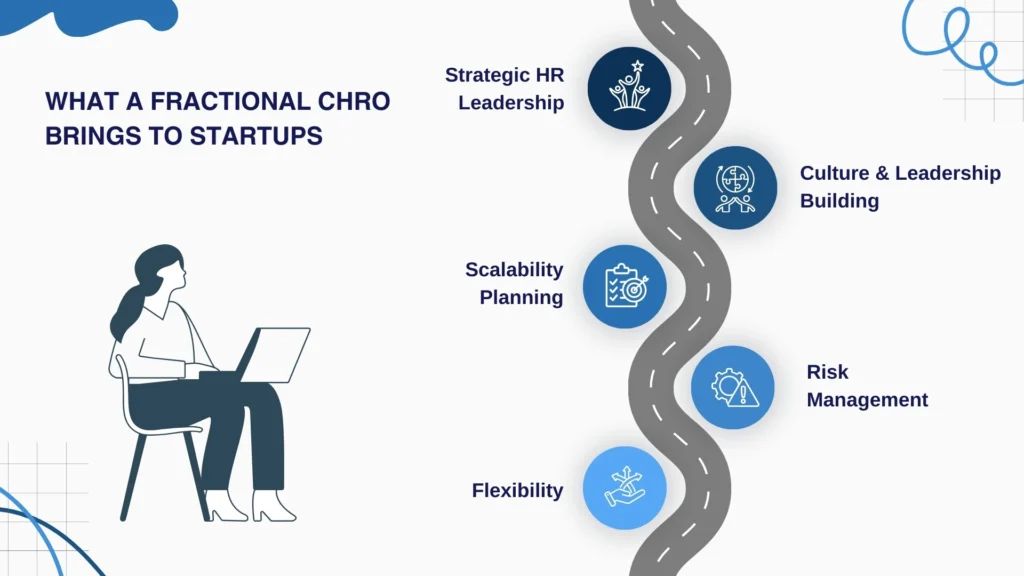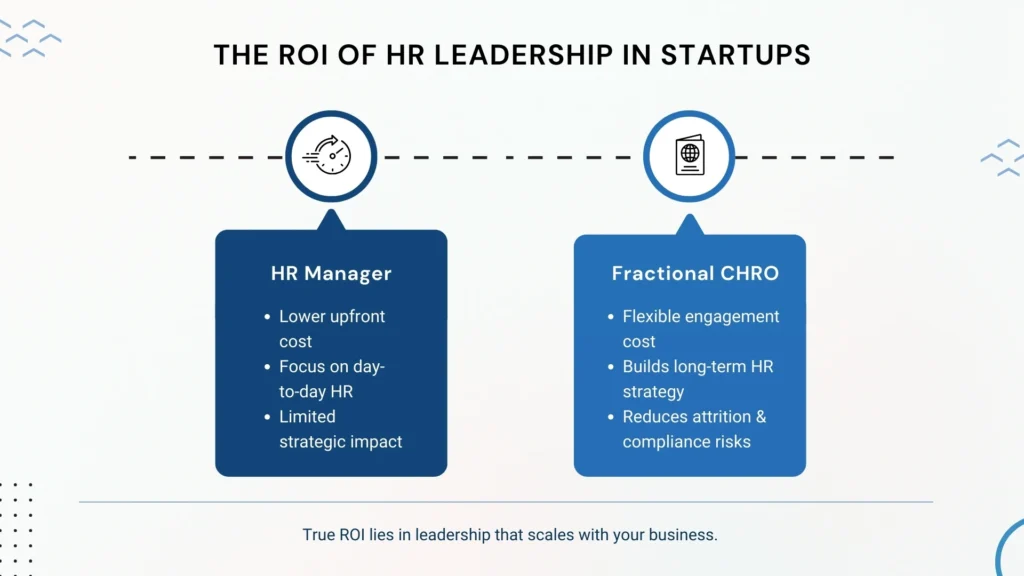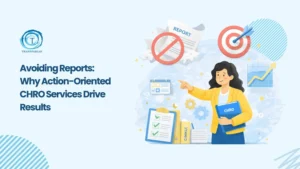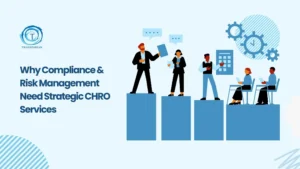Startups move fast, scale unpredictably, and often operate with lean teams where every hire has to justify their value. Some of the key decisions which founders need to cover concern whether or not to engage a Fractional CHRO or a full-time HR/People Manager. Each of the two roles has a unique role in developing people systems, but the preference is dependent on the stage of a startup, ambition, and desire of strategic leadership. Knowledge of such differences assists the founders in making decisions on who is actually more efficient at every stage of development.
The Role of an HR Manager in Startups
The first HR hire, even in new companies, is an HR Manager whose emphasis is on doing. The main roles of them will be:
- Recruitment and onboarding: Designing job descriptions, coordinating interviews, and ensuring new hires integrate well.
- Employee relations: Handling grievances, engagement activities, and day-to-day workforce needs.
- Payroll and compliance: Overseeing leave policies, maintaining employee data, and ensuring hr statutory compliance like PF, ESI, and professional tax filings.
- Operational efficiency: Supporting founders with routine HR functions so leaders can focus on business.
Consistency and smooth running people operations is the strength of the HR Manager. But during growth spurts, the position isn’t usually strategic enough to prepare workforce prescriptions according to the growth of a company.
What a Fractional CHRO Brings to the Table
A Fractional CHRO serves at the leadership level but on a part time, project or retainer basis. As opposed to a HR Manager, they are not merely a policy administrator; they are people vision setters. The difference between them is the following:

Strategic HR leadership: Creating an HR approach of startups that would be in harmony with the growth, investment stage, or new territories.
Culture and leadership building: Development of organizational profile, leadership development and succession planning.
Scalability planning: Arrangement of teams, mapping out career paths, and the fact that the company attains growth that is sustainable.
Risk management: Minimize the liabilities using governance, policies and CHRO services which enhance compliance and workplace ethics.
Flexibility: Acting as a fractional HR manager, they deliver high-level insight without the cost burden of a full-time CHRO hire.
For startups not yet ready to fund a C-suite HR executive, a Fractional CHRO provides the middle ground: strategic depth without long-term overhead.
Key Differences Between Fractional CHRO and HR Manager
| Dimension | HR Manager | Fractional CHRO |
| Focus | Operational HR tasks | Strategic and cultural leadership |
| Engagement Model | Full-time employee | Part-time or project-based |
| Expertise Level | Early-career to mid-level HR | Senior leadership with cross-industry experience |
| Value Delivered | Day-to-day HR stability | Growth-focused transformation |
| Cost | Salary + benefits | Flexible pricing via outsourced CHRO services |
This comparison reveals why many early-stage startups start with an HR Manager but later graduate to Fractional HR leadership as scaling demands intensify.
When Startups Outgrow an HR Manager
The question that frequently comes to mind of founders is when is the right time to go beyond a People Manager?The signs are clear:
- Headcount exceeds 30–40, and systems start breaking down.
- Employee turnover rises due to weak engagement or unclear career paths.
- Leadership bandwidth is stretched with constant HR firefighting.
- Investors or boards demand structured HR governance.
At this point, engaging a Fractional CHRO or other version of a Virtual HR leadership ensures that founders receive a seat at the key strategic table, and have people strategy to move into the next stage of their growth.
Cost vs. Value of HR Leadership
One which is often not mentioned is ROI of leadership versus execution. Although an HR Manager is cheaper to employ at a given point in time, when a business loses talent because of weak career structures or when a business fails to pass a compliance audit, the secret costs add up.

Compared to this, the regimentation that a fractional HR executive appears to be at first blush must be counted as incremental costs but it does pay off in restricted turnover, amplified governance, and company-ready to scale. This is why many founders see CHRO services as investments, not costs.
The Global and Remote Dimension
As startups have begun to incorporate remote-first or hybrid working solutions, HR becomes ten times more complicated. In this case, a fragmented HR manager or Virtual HR infrastructure can harmonize remote workforces, establish international rules and regulate legal jurisdiction in other places.
HR Managers tend to have low success levels when it comes to international structures whereas the senior chro human resources best practice can develop scalable systems that allow remote on-boarding, virtual engagement, and global compliance. It is a remote flexibility that makes HR leadership consulting an increasingly popular option of startups penetrating various markets.
HR Leadership Beyond Compliance
Though highly proficient in bringing about her statutory compliance, a Fractional CHRO moves beyond the checklist into transformational HR. They help startups answer questions like:
- What kind of culture do we want to build?
- How do we prepare first-time managers to lead teams effectively?
- What systems do we need before hitting 100 employees?
- How can we embed DEI, innovation, and engagement into our DNA?
These are questions that extend beyond the payroll and policies- these are questions that will determine the future identity of the company.
How HR Partners Support Startups in Both Models
Other startups do not want to make a choice between the two positions but rather unify them in one frame via the HR Partners. In such models:
- An HR Manager handles daily operations.
- A Fractional CHRO guides strategy and coaches leadership.
- External specialists provide HR leadership consulting on niche needs like compensation benchmarking, leadership training, or M&A integration.
The mixed strategy makes the tactical implementation not to be stalled and, at the same time, keeps the strategic priorities in motion.
Final Thoughts
In the case of startups such as Microsoft, it is not a question of who is better: an HR Manager or a Fractional CHRO but timing, strategy and scale. The HR Manager maintains the system; the Fractional CHRO lays out the basis of the future growth. In combination, with hiring the support of HR Partners and HR leadership consulting they help build people systems that accelerate innovation, stability, and long term prosperity.
FAQ’s
Not at the earliest stage, but as soon as culture, leadership gaps, or scaling challenges emerge, a Fractional CHRO can be the difference between smooth growth and chaotic attrition.
While consultants give advice, a Fractional HR leader is embedded within the startup’s ecosystem, working hands-on with the leadership team.
Instead of bearing a full-time executive salary, startups pay only for the leadership time they need through outsourced CHRO services.
Yes, but they may need coaching, mentorship, and exposure to strategic HR functions. Pairing them with CHRO services can accelerate this development.
Investors increasingly look at governance, compliance, and people culture. Strong HR leadership frameworks signal maturity and reduce risk for investors.















